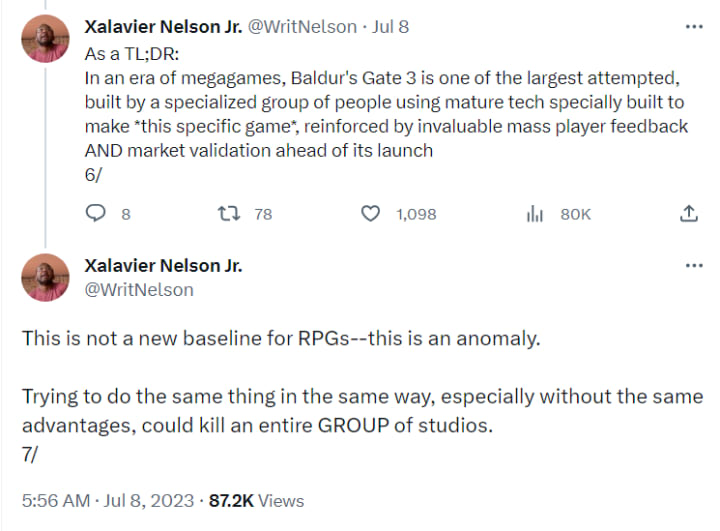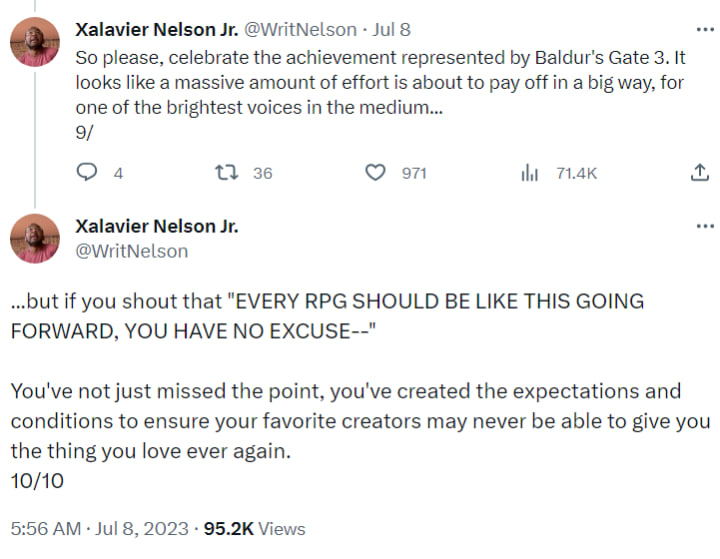In Defense of Game Developers
Certain critics would do well to learn a little bit about the industry they cover.

It's funny what a difference a few decades makes.
Twenty years ago, very few people outside of the video game industry knew what "crunch" was. That all changed with a 2004 blog post called "EA: The Human Story," written by Erin Hoffman (then anonymous). The post concerned the grim conditions that Hoffman's spouse faced at Electronic Arts during the end stages of the development cycle. This included work weeks that could run 70 to 90 hours, often without overtime pay.
That post gave a serious black eye to the industry, especially EA who would be known for years thereafter as the company destroying their employees to crank out football games. And for a time, video game enthusiasts saw themselves as friends of those developers - a coalition of workers and consumers fighting the greed of the industry.
Flash forward to 2023. Once again, the industry looks bad and everyone hates the big companies for their greed, albeit for a new and exciting set of reasons. Into this situation comes IGN who, on August 10, post the video "Baldur’s Gate 3 is Causing Some Developers to Panic" by Destin Legarie.
And suddenly everything changes. Within days, the video game space is full of people piling onto developers as a class, blaming them for everything wrong with the industry. As I write this, anti-developer sentiment is continuing to spread as Legarie's hangers-on are coopting his ideas.
So what happened here, anyway?
Let's look at Destin Legarie's video
Most of what's in Legarie's video isn't new. He rests his rant on two major complaints that are related. First, that video games are often released in an unfinished state, with bugs or incomplete features that have to be fixed post-release. Second, that video games are employing increasingly aggressive post-sale monetization in the form of microtransactions and battle passes (read: premium upgrade paths).
If you've spent any time in the video game commentary space, you'll have heard plenty about both points. Legarie's overarching argument is that Baldur's Gate 3 proves that this is unnecessary. Not to be pedantic, it's not a great argument as Baldur's Gate 3 spent three years in Early Access - a Steam program that allows a game to be sold before it's 100% complete - so it was arguably released in an unfinished state as well, but never mind that.
What stands about Legarie is where he chose to put the blame. Usually, such complaints are directed at the companies - the CEO if known, otherwise just the entire company as an entity. Legarie, on the other hand, opted to single out developers as the problem.
And really, he chose to single out one specific developer.
Let's talk about Xalavier Nelson Jr.
Xalavier Nelson Jr. is the head of the indie game development studio Strange Scaffold, a busy little team that's put out six games since 2021 including Space Warlord Organ Trading Simulator and An Airport for Aliens Currently Run by Dogs. He has also written for a few other games, including some under the Stranger Things IP.
He is not a AAA developer. That's important to remember.
On July 8, he posted the following thread to Twitter:
Nelson is one of the "panicking developers" in Destin Legarie's video. In fact, he is very prominently featured not just there, but in a lot of subsequent content based on Legarie's rant. Many of those people seem like they don't know who Nelson is and I don't think any of them followed the thread.
Was Xalavier Nelson Jr. writing industry apologia, arguing that people should just learn to accept bugs and microtransactions? No. In fact, he doesn't mention either of these things, despite what Legarie implies.
Nelson's argument that Baldur's Gate 3 can't be used as a "raised standard" is based on economic risk.

You see, the industry started to play it very safe from about the seventh console generation on. At the time Hoffman was writing about crunch, many AAA companies were addressing rising costs by taking fewer risks. That meant making games in easily marketable genres, ideally in franchises, with reliable (and short) development cycles. This was the best way to keep shareholders happy.
In recent years, some studios have been taking bigger risks in an attempt to make bigger games. The 2000s way was to release games on a 1-2 year cycle, while Baldur's Gate 3 had a seven year cycle, with some of the other games Legarie mentioned being comparable in this regard.
A seven-year cycle isn't unheard of in the indie space, but for a AAA game, that means losing a lot of money. It means taking a big gamble - and when you take a big gamble, you sometimes lose everything.

So Nelson wasn't talking about the same things that commentators love to complain about. He was talking about risk. If every game is a risk on this order, you're going to see a lot of big failures that take their companies down with them.
Legarie apparently didn't know this. What's more, he didn't seem to care.
Let's talk about business practices (briefly)
I've interviewed my fair share of developers - more than the talking heads, at least. These are smaller teams, most of them working on passion projects that they hope will boost their visibility in the industry. Business is still an issue for them, but without shareholders or a CEO, they are spared the worst of it - no crunch, no demands to monetize the hell out of the project.
But of course that's the case. Do you think that it's a bunch of programmers, level designers and composers who are pitching ideas for cash shops? Do you think that the loot box was some project lead's grand vision? That's silly - all of those are business calls made by the people on the business end.
So why is everyone mad at the developers now?
Apart from Destin Legarie horribly misrepresenting one of them, I mean.
I've read a few possible explanations for this rather sudden wave of anti-developer sentiment. The one that makes most sense to me is that it's all down to availability. When people are mad, they vent their rage on whomever they can reach. It's why perfectly rational people scream threats at customer service reps as though these people had anything to do with their problems.
Back when Erin Hoffman was writing about crunch, no one really knew about developers. The 90s had been the era of the rockstar / auteur dev, but the 2000s were defined more by large companies. Hoffman's spouse was just some drone being victimized by a big corporation, and as such he was both more distant and more sympathetic. He was like any of us.
But in an era where anyone trying to make a splash is expected to live on Twitter, things are very different. Xalavier Nelson Jr. is something of a public figure - far more so than anyone was in the 2000s, at least. Meanwhile, the people making the actual calls are staying out of it. You don't see a lot of executives with YouTube channels or personal Twitter accounts or blogs full of behind-the-scenes details on upcoming games.
In short, Nelson was an easy target for anyone trying to create ragebait content. He doesn't look anything like the bad gays in these narratives about industry greed, but it doesn't matter so long as there's someone to yell at.
I could play the same game - after all, I have held up Destin Legarie as the villain of this piece. I could go on a shopworn tear about the dismal state of video game journalism and I would mean every word of it. As someone who's spent the entire year working on an article about the state of the indie gaming scene that won't get even 1% of the exposure that Legarie's video has received, I can say with all honesty that he disappoints me.
But I believe in being productive above all else. So if you don't like the fact that AAA games have battle passes and bugs, don't harass a dev and don't complain about those games - just don't buy them. There's a world full of smaller developers who need support, and every time you buy one of their games (or two, or three, or four - they're cheap), every time you talk about and make content about their games, you are taking just a tiny little bit of power away from those big companies.
The question is - do you want change or do you want drama?
And if you choose the former, I might note that you can buy Xalavier Nelson Jr.'s entire catalog for the price of some individual AAA games. Just sayin' is all.
And as long as you're supporting the underdog, why not check out last year's article on the state of indie? There's a new one coming in a few months, you know.
About the Creator
Andrew Johnston
Educator, writer and documentarian based out of central China. Catch the full story at www.findthefabulist.com.
Enjoyed the story? Support the Creator.
Subscribe for free to receive all their stories in your feed. You could also pledge your support or give them a one-off tip, letting them know you appreciate their work.






Comments
There are no comments for this story
Be the first to respond and start the conversation.